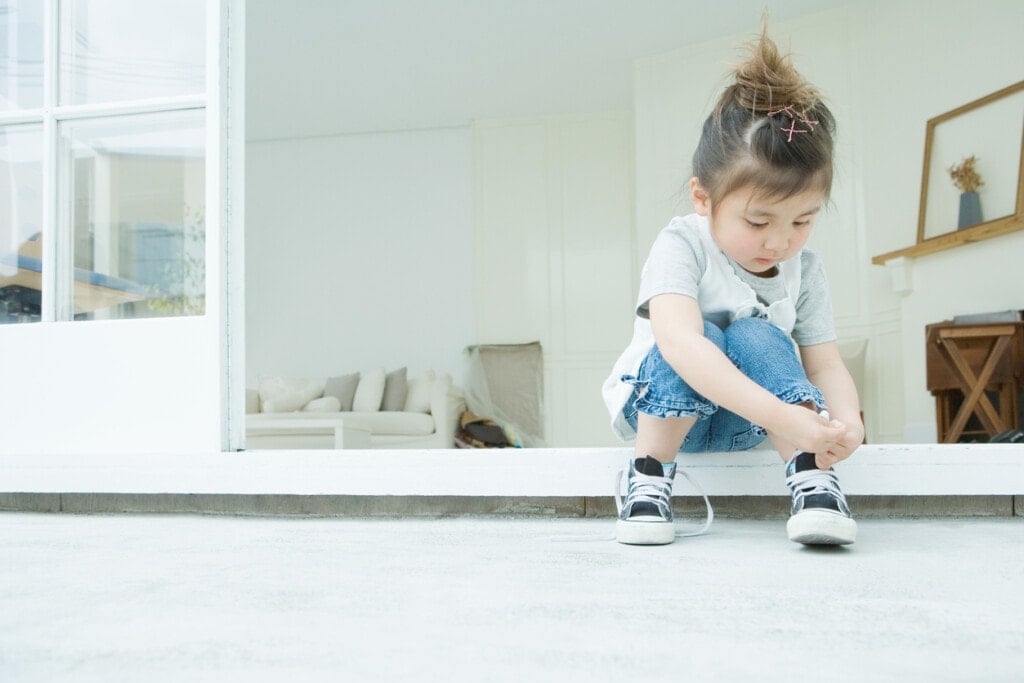“Can you help me tie my shoes, mommy?” When you’re in a rush in the morning trying to get the kid(s) and yourself organized for the day and on time, it’s tempting to swoop in and tie your child’s shoes for them. In 20 seconds, you can move on to the next task and get on with your day. But what happens tomorrow when they need help and the day after that? You know they can do things for themselves, but when your heart rate is going up and the time is slowly ticking away, you want to jump in and do something for them. However, it’s important to learn how to teach them independence.
It’s not just the practical nature of them being able to tie their shoes and saving time for the morning routine. Consistently doing things for your child that they can do for themselves accidentally sends them a message that you don’t believe in them or their abilities. Children who demonstrate independence have higher self-confidence and self-esteem and are more motivated. These things help equate to a positive self-image and increased striving toward achievement.1
What is Independence and When Can We Teach It to Children?
Independence is about being in control. For humans, it’s being able to control and make choices about their life. We can also refer to it as autonomy, a person’s capacity to act on their interests and values.2 We see our children strive for independence from an early age, grabbing for their bottle, wanting to dress themselves, or saying things like “I can do it myself.” It’s an instinct to seek control in our world, as it helps keep us safe, but becoming independent is a skill parents need to foster in their children. The early preschool years are when this desire and capacity to be independent starts to kick in developmentally.3
How Can We Teach Independence to Our Children?
Let Your Child Fail Safely
Don’t swoop in unless things are unsafe; allow your child to fail safely. What I mean by this is don’t rush in to fix it because your child will miss all the lovely opportunities to problem-solve and persevere, which helps with independence and resilience. You can still offer support and ask them what they need or ask if they are open to you suggesting strategies to try. However, if they are physically and emotionally capable of the activity, let them try it!
Ask Them What They Can Do
Involve your child in listing their skills! Sit down with them and figure out what they feel confident they can manage independently. Not only will you both have a chance to marvel at their skills (watch that self-esteem soar!), but it will also indicate which activities you should allow them to manage when it’s safe to do so.
Plan to Avoid Time Pressures
Planning is easier said than done, but if your child is keen to do more activities to prepare for school, then make the additional time so you both aren’t under pressure. Stress will make it harder for them to concentrate, but it will also make you more likely to swoop in and fix it.
Put a Pause on Perfection
Okay, your child’s outfit might be misbuttoned, or their hair or face might be messy. Still, the benefits far outweigh the negatives if they had the opportunities to look after their dressing, feeding, or other self-care activities. Just be mindful not to be critical or go in and fix their mistakes.
Look for Chances to Offer Praise
Avoid saying things like “good boy” or “good girl.” Instead, identify what strategy they used or the efforts they put into trying to be independent. This will have a much more positive impact because they will learn what behaviors you would like to see again. On the other hand, they also internalize that being a “good boy” or “good girl” is associated with compliance or you being pleased with them.
Teach Them About Problem-Solving
Before they complete an activity, check in with them if there are multiple steps. Do they need to prepare anything? Or do they have foundational skills before they try this task? Asking them questions about their process will get them thinking about steps or sub-goals, which helps them problem-solve or figure out when they have gotten off track.
Allow Risk
Yep, this one can be hard. Allowing our kids to be exposed to risk intentionally sounds like a bad idea. However, if they don’t make mistakes, how will they learn the consequences, and why do they need to change their behavior or action to mitigate the risk? Jump in if they are reaching for a hot stove or about to step out onto the road without looking. I mean more minor risks, like saying, “Don’t run in socks; you might slip.” If they do slip, they may learn that socks are slippery and could create their own rules about running in socks, which can have a far more significant impact than telling them why or why not something is a good or bad idea.
Tips to Teach Your Child Independence
Encourage Activities of Daily Living
These are important for other issues like privacy and body safety, but general self-esteem comes from being able to look after themselves. Daily living activities include washing, feeding, dressing, and cleaning up after themselves.
Have Them Help with Chores
I’m not talking about chores in exchange for money, although some families choose that route. I’m talking about contributing to the running of the family home. Not only will your child feel pride from completing specific tasks, but being involved in the running of the household helps them feel connected to and part of their family unit, which brings confidence and self-esteem. This could include putting their dishes in the sink, putting their clothes in the hamper, or helping plan dinner menus.
Offer Them Choices
Children should have choices, but don’t offer too many options. Try simple ones, like “Would you like the red or green cup?” Or “Would you prefer to go to the park or play puzzles?” Offering choice shows you are confident in them and allows them to consider their own needs, values, and preferences, which helps build independence.
Let Them Entertain Themselves
Not every moment of life needs to be scheduled or planned. Your child needs the opportunity to get bored to develop skills to self-entertain. This helps them become more independent when they can self-direct their play and activity. It also gives you additional space for things you need to focus on. It can help them understand that they and you have different and independent needs sometimes, which is perfectly acceptable.
By showing your child that you believe in their capabilities and that independence is something positive, you are setting them up to be self-driven, motivated, and more confident. They are less likely to cling and can step out of their comfort zone and explore new things. Although this can be tricky as a parent, watching your child’s increasing desire to be independent takes them away from you. Still, it’s essential to teach them independence for their development and transition into adulthood as confident and self-assured people.































